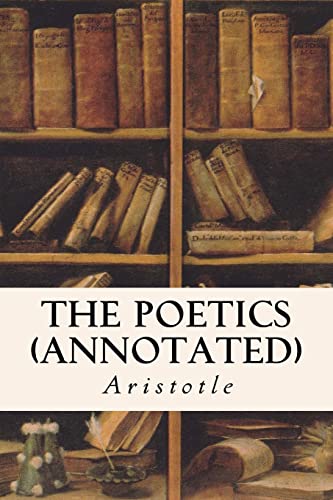Items related to THE POETICS (annotated)

"synopsis" may belong to another edition of this title.
"About this title" may belong to another edition of this title.
- PublisherCreateSpace Independent Publishing Platform
- Publication date2015
- ISBN 10 1517793297
- ISBN 13 9781517793296
- BindingPaperback
- Number of pages78
- Rating
Buy New
Learn more about this copy
Shipping:
US$ 2.64
Within U.S.A.
Top Search Results from the AbeBooks Marketplace
Poetics
Book Description Condition: New. Seller Inventory # 24973717-n
THE POETICS (annotated) (Paperback)
Book Description Paperback. Condition: new. Paperback. Aristotle's Poetics is the earliest surviving work of dramatic theory and the first extant philosophical treatise to focus on literary theory. In it, Aristotle offers an account of what he calls "poetry" (a term which in Greek literally means "making" and in this context includes drama-comedy, tragedy, and the satyr play-as well as lyric poetry and epic poetry). Aristotle's Poetics (335 BC) is the earliest surviving work of dramatic theory and first extant philosophical treatise to focus on literary theory in the West. This has been the traditional view for centuries. However, recent work is now challenging whether Aristotle focuses on literary theory per se (given that not one poem exists in the treatise) or whether he focuses instead on dramatic musical theory that only has language as one of the elements.[4] In it, Aristotle offers an account of what he calls "poetry" (a term which in Greek literally means "making" and in this context includes drama - comedy, tragedy, and the satyr play - as well as lyric poetry and epic poetry). They are similar in the fact that they are all imitations but different in the three ways that Aristotle describes: Differences in music rhythm, harmony, metre and melody. Difference of goodness in the characters. Difference in how the narrative is presented: telling a story or acting it out. In examining its "first principles", Aristotle finds two: 1) imitation and 2) genres and other concepts by which that of truth is applied/revealed in the poesis. His analysis of tragedy constitutes the core of the discussion.[5] Although Aristotle's Poetics is universally acknowledged in the Western critical tradition, "almost every detail about his seminal work has aroused divergent opinions".[6] The work was lost to the Western world for a long time. It was available in the Middle Ages and early Renaissance only through a Latin translation of an Arabic version written by Averroes. Aristotle's work on aesthetics consists of the Poetics, Politics (Bk VIII) and Rhetoric. The Poetics is specifically concerned with drama. At some point, Aristotle's original work was divided in two, each "book" written on a separate roll of papyrus. Only the first part - that which focuses on tragedy and epic (as a quasi-dramatic art, given its definition in Ch 23) - survives. The lost second part addressed comedy. Some scholars speculate that the Tractatus coislinianus summarises the contents of the lost second book. The Arabic version of Aristotle's Poetics that influenced the Middle Ages was translated from a Greek manuscript dated to some time prior to the year 700. This manuscript, translated from Greek to Syriac, is independent of the currently-accepted 11th-century source designated Paris 1741. The Syriac-language source used for the Arabic translations departed widely in vocabulary from the original Poetics and it initiated a misinterpretation of Aristotelian thought that continued through the Middle Ages. Paris 1741 appears online at the Bibliotheque nationale de France (National Library of France). Arabic scholars who published significant commentaries on Aristotle's Poetics included Avicenna, Al-Farabi and Averroes.[25] Many of these interpretations sought to use Aristotelian theory to impose morality on the Arabic poetic tradition.[26] In particular, Averroes added a moral dimension to the Poetics by interpreting tragedy as the art of praise and comedy as the art of blame.[27] Averroes' interpretation of the Poetics was accepted by the West, where it reflected the "prevailing notions of poetry" into the 16th century. Shipping may be from multiple locations in the US or from the UK, depending on stock availability. Seller Inventory # 9781517793296
THE POETICS (annotated)
Book Description Condition: New. Seller Inventory # ABLING22Oct2018170176053
THE POETICS (annotated)
Book Description Paperback / softback. Condition: New. New copy - Usually dispatched within 4 working days. Seller Inventory # B9781517793296
THE POETICS (annotated)
Book Description Paperback / softback. Condition: New. This item is printed on demand. New copy - Usually dispatched within 5-9 working days. Seller Inventory # C9781517793296
Poetics
Book Description Condition: New. Seller Inventory # 24973717-n

